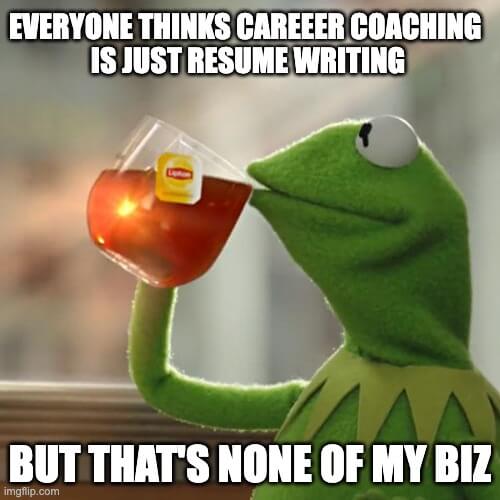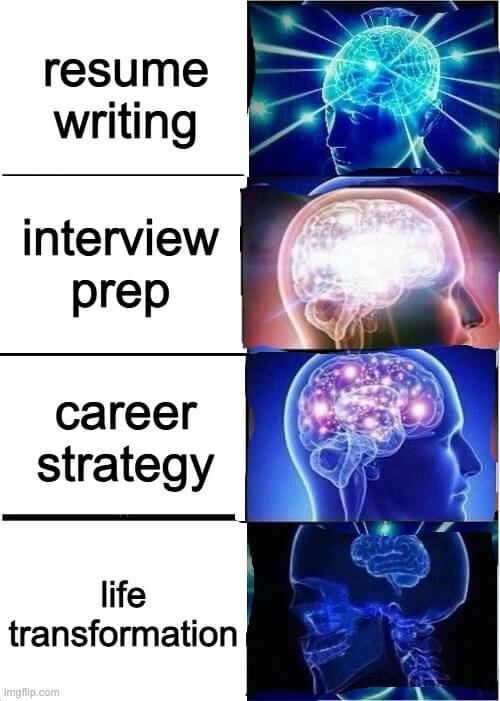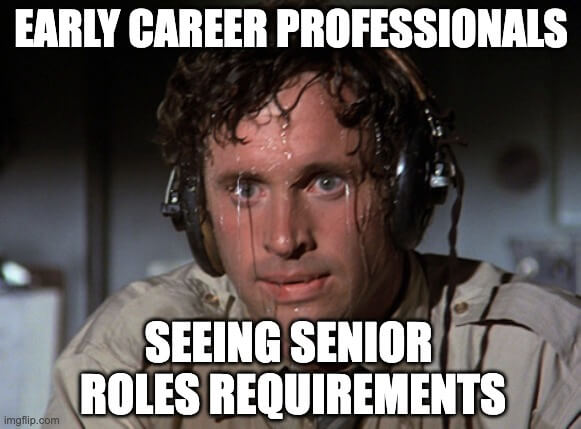The job market is changing fast and more people than ever need guidance in their careers.
Have you ever thought about helping others navigate their careers while building a business for yourself?
If so, being a career coach might be for you. This article will take you through everything you need to know to start and grow a career coaching business.
Want to jump straight into the 30-90-365 plan? Go there now.
What is Career Coaching?
Career coaching is more than just giving advice on resumes and job interviews.

As a career coach, you’ll be a trusted guide helping clients find their professional path, overcome obstacles and achieve their career goals. According to the International Coaching Federation (ICF) the global coaching industry is $2.85 billion a year and career coaching is a big part of that.
Career coaching is more than just giving advice on resumes and job interviews. As a career coach you’ll be a trusted guide helping clients find their professional path, overcome obstacles and achieve their career goals.
Market Size and Opportunities
The coaching industry has grown massively, $5.34 billion in 2023 and is projected to be $6.25 billion.

The industry has grown 62% since 2019, with 109,200 certified coaches worldwide – 54% more than 2019. North America is the biggest market, generating $2.08 billion in revenue. Coaches charge an average of $244 an hour, 9% more than 2019. Career coaching is a growing profession.
Sources:
https://coachingfederation.org/research/global-coaching-study
https://coachingfederation.org/app/uploads/2020/09/FINAL_ICF_GCS2020_ExecutiveSummary.pdf
https://blog.marketresearch.com/top-6-things-to-know-about-the-personal-coaching-industry
Career Coaches Wear Many Hats
Career transition strategists
Professional development accountability partners
Job search experts
Career advancement mentors
Support system during professional challenges
Your Foundation
Before you get into certification and business setup you need to understand the foundational elements of a career coach.
Core Skills and Qualities

The best career coaches have:
Professional Competencies:
Good active listening skills
Great communication skills
Problem-solving skills
Goal-setting skills
Assessment and evaluation skills
Personal Attributes:
Empathy and emotional intelligence
Patience and persistence
Curiosity and a continuous learning mindset
Flexibility and adaptability
Strong ethical compass
Education
There’s no educational requirement to be a career coach but having an educational foundation can be beneficial for your credibility and effectiveness. Here are common educational paths:
Recommended Degrees:
Psychology
Human Resources
Business Administration
Counseling
Organizational Development
Your Expertise
Theoretical knowledge is not enough — practical experience is key to being a career coach.
Get Practical Experience
Start with Pro bono work:

(thanks to Imgflip for the memes)
Offer free sessions to friends and family to get initial feedback and hone your coaching skills.
Volunteer at local career centers to help people in need and expand your network in the community.
Partner with non-profit organizations to provide career coaching to underserved populations and get exposure to different client needs.
Help recent graduates with job searches, offer guidance on resume building, interview preparation and career path exploration.
Support professionals in career transitions by providing strategic advice on industry changes and achieving their professional goals.
Internships and Apprenticeships:
Find internships with established career coaches to see how they coach and learn from experienced mentors.
Consider apprenticeships with coaching firms that offer structured learning and real client work.
Networking and Mentorship:
Attend industry events and workshops to meet other coaches and potential clients and expand your network.
Join coaching associations to get access to resources, training and mentorship that can support your coaching methodology.
Online Platforms and Communities:
Join online coaching communities and forums to share your experiences, ask for advice and learn from other coaches.
Use social media to connect with leads and share your expertise via useful content.
Continued Education and Training:
Take additional career coaching certification programs to learn advanced coaching techniques and industry updates. These programs not only improve your coaching skills but also keep you up to date with the latest methods and tools you can apply in your business.
Stay current with job market updates and best practices by subscribing to industry publications and attending webinars. Going to seminars and workshops regularly can give you insights into what’s new, what’s being hired for and what’s changing in the job market.
Plus engaging with thought leaders and participating in discussions can give you a broader perspective so you can offer more to your clients. Being up to date not only increases your credibility but also positions you as a go to expert for your clients which in turn grows your career coaching business.
Your Methodology
Create your own coaching approach by:
Documenting client sessions to find patterns and what works so you can replicate it in future sessions. This helps you refine your coaching skills and provides a foundation for case studies and testimonials that can increase your credibility.
Develop assessment tools specific to your niche. These can include personality assessments, skills inventories and career interest surveys that help clients discover their strengths and areas for growth. Customized assessments allow you to offer tailored coaching strategies to each client’s unique needs.
Create coaching frameworks that outline the step by step process you use to guide clients through their career transitions. A framework can be a roadmap for both you and your client to follow so each session is focused and productive. It also sets clear expectations and measurable outcomes for the coaching relationship.
Build exercise libraries that include a range of activities and exercises to challenge clients and help them discover themselves. These can be goal setting worksheets to visualization techniques and role playing scenarios. Having a library of exercises means you can keep sessions fresh and adaptable to different learning styles.
Set up processes for client onboarding, session management and follow up. A process helps you deliver a professional and efficient coaching experience and increases client satisfaction and retention. This includes setting up automated systems for scheduling, reminders and feedback collection so you can focus on delivering great coaching sessions.
Specializing
Specializing can help you stand out in the market. Here are some popular specializations:
Industry Focus:
Technology sector transitions
As the tech industry is changing so fast, career coaches specialising in this area can help clients navigate the tech career landscape, from understanding new technologies to transitioning into new roles within the sector.
Healthcare professional development
The healthcare industry is constantly changing with new regulations and technologies, coaches in this niche can help healthcare professionals advance their careers whether through leadership roles or specialization in new areas.
Creative industry careers
The creative sector is diverse and fast paced, coaches who understand the unique challenges and opportunities in areas like design, media and the arts can help clients build their portfolios, network and find the right creative opportunities.
Financial services advancement
The financial industry requires specific skills and knowledge. Career coaches specialising in financial services can help clients develop their expertise, gain certifications and advance into higher roles in banking, investment or financial planning.
Educational sector careers
Education professionals often need guidance on career progression or moving between educational roles. Coaches in this area can offer insights into educational leadership, curriculum development and opportunities in educational technology.
Client Type:
Early career professionals

This group need guidance on finding career paths, building foundational skills and navigating their first job search. Coaches can help with resume building, interview prep and setting up professional networks.
Mid career changers
Those looking to pivot their careers can benefit from coaches who specialise in career transition. These coaches can help with identifying transferable skills, exploring new industries and creating a career strategy.
Executive leadership
Executives have unique challenges in leadership roles. Coaches in this area can help executives develop their leadership skills, manage organisational change and achieve strategic objectives.
Entrepreneurs
Aspiring and established entrepreneurs can benefit from career coaches who understand the complexities of starting and scaling a business. These coaches can help with business planning, market analysis and personal branding.
Return to work parents
Parents returning to the workforce often need support in upskilling, building confidence and finding flexible work. Coaches can help with a tailored job search strategy and work life balance.
Certification
While certification is not legally required to practice as a career coach, it’s certainly adds credibility and provides the tools and framework for your business. But the most important factor in your success as a career coach is results for your clients.
Good results without a certification is far more valuable than mediocre results with one. The right certification can certainly set you apart in a growing market but ultimately it’s your ability to help clients achieve their career goals that will define your reputation and success in the coaching industry.
Top Certification Programs
The International Coach Federation (ICF) has 3 levels of credentials:
Associate Certified Coach (ACC): 60 hours of training and 100 hours of coaching experience
Professional Certified Coach (PCC): 125 hours of training and 500 hours of coaching experience
Master Certified Coach (MCC): 200 hours of training and 2,500 hours of coaching experience
The Certified Professional Career Coach (CPCC) program by the Professional Association of Resume Writers and Career Coaches is another option. $1,195 for 12 weeks of training in career coaching fundamentals.
Choosing Your Certification Path
Consider these when choosing a certification program:
Time commitment
Total cost including materials and supervision
Reputation in the industry
Alignment with your coaching goals
Support and resources
Most new coaches start with the ACC or CPCC program and then move up to higher certifications as their business grows.
Starting Your Career Coaching Business
Turning your coaching skills into a business requires planning and strategic decision making.
Business Setup Essentials

Legal Requirements:
Register your business (LLC is common for coaches)
Get necessary licenses and permits
Set up business banking
Get professional liability insurance
Create client contracts and agreements
Tools:
Video meeting platform (Zoom, Google Meet)
Scheduling software (Calendly)
Writing, spreadsheet, collaboration, etc. (Google Workspace, Trello)
Pricing Your Services
According to PayScale, career coaches earn between $45-$250 per hour, with the median rate at $81. Here are some pricing structures you can use:
Entry-Level Packages:
Single session: $150-200
3-month program: $1,500-2,000
6-session package: $800-1,000
Premium Offerings:
VIP day intensive: $2,000-3,000
Executive coaching package: $5,000-10,000
Group coaching programs: $500-1,000 per person
Building Your Brand
Your brand should reflect your unique value proposition and attract your ideal clients.
Brand Development
Define your coaching philosophy
Your philosophy should outline the core beliefs and values that underpin your coaching practice. This will help you establish a solid foundation for your brand and communicate with your target market. What makes your approach different and how does it benefit your clients?
Choose a memorable brand name
Pick a name that resonates with your target market and reflects your coaching style. A good brand name can make a lasting impression and set you apart from other career coaches. Make sure it’s easy to remember, pronounce and spell.
Get professional visuals
Invest in high-quality visuals, logo, colour scheme and typography that represent your brand. Consistent and professional visuals builds brand recognition and creates a seamless experience for clients across all touchpoints.
Define your brand voice
Your brand voice should be an extension of you and resonate with your target market. Whether formal, friendly or motivational, ensure your communication style is consistent across all platforms, from your website to social media.
Write compelling copy
Write copy that clearly communicates the benefits of your coaching services and addresses the specific needs of your target market. Highlight your unique selling points and how you can help clients achieve their career goals.
Target Market
– Research your ideal client demographics: Know the age, gender, occupation and location of your potential clients. This will help you tailor your marketing to reach your target market effectively.
– Know their pain: Identify the challenges and obstacles your clients face in their careers. By knowing their pain you can offer solutions and position yourself as the go-to expert for their needs.
– Map their career challenges: Analyse the common career challenges your clients face, job transitions, skill development, work-life balance. This will help you create content and services that address those issues.
– Where do they go for help: Where do your clients go to find career guidance? Online forums, social media, professional networks? Knowing where they go for help means you can position your brand in those spaces.
– Know their communication style: How do your clients like to communicate, email, phone calls or social media? Adapt your communication style to their preferences and you’ll get better client engagement and satisfaction.
Marketing and Client Acquisition
The next step to the question, “How do I become a career coach” is the sales and marketing part — which many people hate.
Regardless of your stance, you must attract and retain clients. There’s no other way. I’ve included a few tips to get you started.
Online Presence
Website Development:
Professional domain name
Clear service offerings
Client testimonials
Blog content
Lead capture systems
Social Media Strategy:

LinkedIn (primary platform for career coaches)
According to HubSpot 82% of coaches get clients through LinkedIn, it’s the number one platform for career coaches.
Networking and Partnerships
Professional Connections:
Coaching associations
Industry conferences
Local business groups
HR professionals
Complementary service providers to partner with
Client Attraction Systems
Lead Generation:
Free discovery calls (15-30 minutes)
Lead magnets (career guides, assessments)
Webinars and workshops
Referral programs
According to ICF, 71% of coaching clients come through word-of-mouth referrals, so great service delivery is key to business growth.
Ethics and Professional Standards
Great ethics is non-negotiable in career coaching.
Ethical Guidelines
Core Principles:
Client confidentiality
Professional boundaries
Honest marketing
Clear communication
Transparent pricing
Professional Boundaries
Setting Clear Expectations:
Service scope definition
Communication protocols
Response time standards
Emergency procedures
Termination policies
Success Metrics for a Successful Career Coaching Practice
Measuring success helps you refine your coaching practice and prove value to clients. Understanding and tracking success metrics is important for your growth as a career coach and for showing the tangible benefits to your clients.
By setting clear objectives and measuring outcomes you can improve your coaching strategies and cement your reputation as a successful career coach.
Measuring Client Success
Client success is the foundation of your coaching practice. By tracking key performance indicators you can ensure your clients are achieving their career goals and your coaching is working.
Key Performance Indicators:
Job placement rates: Measure the percentage of clients who get a new job or promotion as a result of your coaching.
Salary increase percentages: Track the average salary increase your clients get after completing your coaching program, so you can show the financial value of your services.
Career transition success: Measure the number of clients who transition into new careers, so you can show you can guide clients through major professional changes.
Client satisfaction scores: Get feedback through surveys or testimonials to measure client satisfaction and identify areas to improve your coaching practice.
Referral rates: Track the number of client referrals, high referral rates means clients trust and are happy with your services.
According to ICF, successful career coaching clients report:
70% improved work performance: Clients get more productive and efficient in their roles.
61% better business management: Clients develop leadership and management skills.
57% better time management: Clients learn to prioritise tasks and manage their time.
51% improved team effectiveness: Clients can work collaboratively and lead teams successfully.
Business Performance Metrics
To keep your coaching business profitable and sustainable you need to track key business metrics. These metrics will give you insight into your financial health and help you make informed decisions for growth.
Key Metrics:
Monthly income: Track your income each month to see if you’re financially stable and if there are trends or fluctuations in your income.
Client retention rates: Measure the percentage of clients who work with you over time, so you can see client satisfaction and loyalty.
Session completion rates: Track the number of sessions clients complete to ensure they’re fully engaged with your coaching program.
Marketing ROI: Measure the return on investment for your marketing to see how effective your marketing is at bringing in new clients.
Operating costs: Track your business expenses to manage costs and stay profitable. Reviewing expenses regularly will help you identify areas to cut costs and be more efficient.
By tracking these metrics you’ll be able to refine your coaching practice, show value to clients and ensure the long term success of your career coaching business.
30-90-365 Plan
Here’s a 30 day plan to launch your career coaching business:
30 Day Launch Plan
Week 1: Register business and setup
Register your coaching business with the relevant authorities to be compliant. This means choosing a business structure (e.g. LLC) and getting any necessary licenses or permits. Set up a business bank account to keep your finances separate from personal expenses.
Week 2: Create basic marketing materials
Create basic marketing materials that explain your brand and services. This means designing a logo, creating business cards and writing an elevator pitch that explains your value proposition to potential clients.
Week 3: Online presence
Get online by creating a professional website that showcases your expertise, services and client testimonials. Optimize your LinkedIn profile to reflect your career coaching credentials and engage with potential clients through content and comments.
Week 4: Network and outreach
Start building your professional network by reaching out to colleagues, industry contacts and potential clients. Attend networking events, join online communities and participate in webinars to connect with others in the coaching industry and expand your reach.
90 Day Growth Plan
Month 1: Get 3-5 clients
Focus on getting your first 3-5 clients through targeted marketing (e.g. free introductory sessions or discounted packages). Leverage your personal and professional network to get referrals and get a client base.
Month 2: Get testimonials and refine offerings
Get feedback from your first clients to get testimonials that show the value of your coaching services. Use this feedback to refine your offerings so they meet the needs and expectations of your target market.
Month 3: Launch marketing
Launch marketing campaigns to increase your visibility and get new clients. Use social media, email marketing and content creation to reach a bigger audience and establish yourself as a career coaching authority.
12 Month Business Roadmap
Q1: Core business operations
Develop and document your coaching processes (client onboarding, session management, follow up procedures). Invest in tools and software to streamline your business and client experience.
Q2: Add more services
Add more services by introducing new coaching packages, workshops or online courses. Tailor these services to specific client needs or industry trends to provide more value and attract a wider client base.
Q3: Group programs
Launch group coaching programs for specific client segments or career challenges. Group programs increase your reach, provide a sense of community for participants and optimize your time by serving multiple clients at once.
Q4: Passive income streams
Create passive income streams by creating digital products (e-books, online courses, membership sites). These products will provide ongoing income and establish you as an authority in the career coaching industry.
Conclusion and Next Steps
Being a career coach is tough yet rewarding. To succeed:
Keep learning and growing
Build real relationships
Maintain high ethics
Adapt to market changes
Focus on client success
Every successful career coach started where you are now. The journey takes time, effort and dedication but the personal and financial rewards are worth it.
The career coaching industry is growing with Forbes reporting a 33% increase in demand for career coaching services since 2020. This trend will continue as professionals navigate more complex career paths.
Follow this guide and focus on your own professional development and client success and you’ll be set up to build a successful career coaching business. The key is to start with a solid foundation and build on it.
Remember your success as a career coach will be measured by your clients’ success. Focus on delivering real value and the business will follow. And that is how you become a career coach.
Related
- Sellfy vs Easy Digital Downloads: the revenue hostage (2026)
- SendOwl vs Easy Digital Downloads: the revenue prison (2026)
- SamCart vs Easy Digital Downloads: the revenue trap (2026)
- Easy Digital Downloads vs Payhip: the revenue ransom (2026 )
- Easy Digital Downloads vs Gumroad: the income handcuffs (2026)
- Easy Digital Downloads vs SureCart: the revenue hostage (2026)
- SureCart alternative: the revenue trap no one mentions (2026)
- 8 Ejunkie alternatives: the cart stuck in 2009 (2026)
- Easy Digital Downloads vs ThriveCart: the piracy problem (2026)
- Sellfy alternative: escape the revenue lockout (2026)
